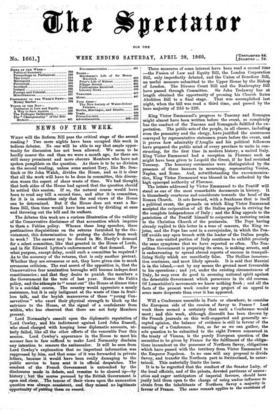NEWS OF THE WEEK.
WHEN will the Reform Bill pass the critical stage of the second reading ? Two more nights have been occupied this week in WHEN will the Reform Bill pass the critical stage of the second reading ? Two more nights have been occupied this week in tedious debates. No one will be able to say that ample oppor- tunity for discussion has not been allowed. We seem to be hardly nearer the end than we were a month ago, for there are still many prominent and more obscure Members who have not spoken pamphlets on the question. As there is to be no division on the second reading, unless some ancient Tory, like Mr. Ben- tin& or Sir John Walsh, divides the House, and as it is clear that all the work will have to be done in committee, this discus- sion wears the aspect of sheer waste of time. We had thought, that both sides of the House had agreed that the question should be settled this session. If so, the natural course would have been to read any bill a second time, and alter it in committee, for it is in committee only that the real views of the House can be determined. But if the House does not want a Re- form Bill, then time would have been saved by dividing at once and throwing out the bill and its authors.
The debates this week are a curious illustration of the validity of the Conservative disclaimer of that accusation which imputes to them a Fabian policy. Whence these long speeches, these pertinacious disquisitions on the returns furnished by the Go- vernment, this determination to prolong the debate from week to week ? The answer may be found in Mr. Hardy's demand for a select committee, like that granted in the House of Lords, and in Sir Edward Lytton's endorsement of that demand. For what purpose, except delay, could such a committee be required ? As to the accuracy of the returns, that is only another pretext.
Whether they are erroneous or not, they have given rise to much erroneous criticism. The real secret of the opposition is, that the Conservatives fear nomination boroughs will become indepei dent constituencies ; and that they desire to punish the members o the Government for the vote of last year. Hence the Fabi a policy, and the attempts to " count out" the House at dinner time It is a suicidal course. The country would appreciate a manly -resistance, but it is only indignant at the waste of time in fruit- less talk, and the boyish manoeuvres of those " young Con- servatives " who exert their physical strength to block up the entrance to the House, at the signal of a confederate from within, who has observed that there are not forty Members present.
Lord Normanby's assault upon the diplomatic reputation of Lord Cowley, and his indictment against Lord John Russell, who stood charged with keeping loose diplomatic accounts, ut- terly failed, like all the other efforts of the venerable Peer this session. Lord Cowley's appearance in the House to meet his accuser face to face sufficed to make Lord Normanby disclaim -any intention to censure the ambassador. It will be seen from Lord Cowley's explanation that no important information was suppressed by him, and that some of it was forwarded in private letters, because it would have been really damaging to the public service to have sent it in official despatches. The conduct of the French Government is untouched by the disclosures made in debate, and remains to be cleared up—by history ; but the course pursued by the British Government is open and clear. The tenour of their views upon the annexation question was always consistent, and they missed no legitimate opportunity of putting them on record. I Three measures of some interest have been read a second time —the Fusion of Law and Equity Bill, the London Corporation Bill, only imperfectly debated, and the Union of Benefices Bill, an useful measure submitted to the Upper House by the Bishop of London. The Divorce Court Bill and the Bankruptcy Bill have passed through Committee. Sir John Trelawny has at length obtained the opportunity of pressing his Church Rates Abolition Bill to a final stage. That was accomplished last night, when the bill was read a third time, and passed by the bare majority of 235 to 226.


























